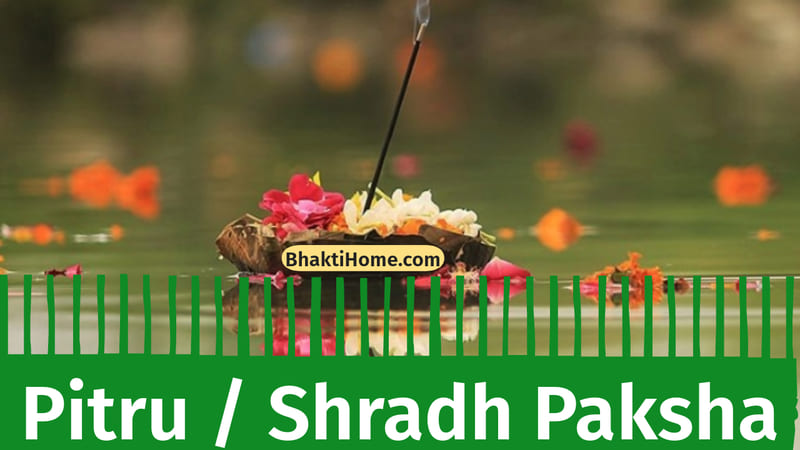
What is pitru paksha?
Pitru Paksha, also referred to as Shradh Paksha, is a 16-day period in Hinduism dedicated to the worship of ancestors.
According to belief, the souls of three generations of deceased ancestors reside in a transitional realm known as Pitrulok (Pitralok). During Pitru Paksha / Shradh Paksha, Yamaraj or Yama, the God of Death, releases these souls to visit their living relatives and accept offerings of gifts, food, and water.
Pitru Paksha / Shradh Paksha is observed annually for fifteen days, during which people typically gather at the banks of rivers, including the sacred Ganges, to offer these provisions to their departed ancestors.
This ritual is conducted with the assistance of priests and Brahmins and is considered an exceptionally auspicious time of the year.
During this period, individuals provide food and water to their deceased ancestors through the intermediaries of priests or Brahmins, as it is believed that the ancestors return to Earth during Pitru Paksha to receive these offerings.
Significance of Pitru Paksha in Hindu Tradition
Pitru Paksha is a period for honoring and paying homage to one's departed ancestors.
It is a belief that through the performance of rituals and the offering of prayers during this time, the souls of these ancestors can attain tranquility and liberation.
Within Hinduism, it is also believed that by engaging in these rituals, individuals can purify themselves from any ancestral karmic influences and receive blessings from their forebears.
Shradh Rituals & Practices During Pitru Paksha
Below are Shradh Rituals and Practices During the Observance of Pitru Paksha.
Tarpan
Tarpan involves offering water and black sesame seeds (til) to the departed souls, ensuring that they have access to pure water in the afterlife.
Pinda Daan
Pinda Daan consists of offering rice balls, prepared with ghee and black sesame seeds, to the ancestors, nourishing their souls and aiding their journey in the afterlife.
Shradh Ceremony
Families often conduct elaborate Shradh ceremonies, where they provide food, clothing, and essential items to priests and Brahmins, considering it an act of charitable giving in honor of the departed.
Donations and Acts of Charity
Many people make donations and engage in acts of charity in memory of their ancestors during Pitru Paksha, believing that it accumulates merit for both the living and the deceased.
Visiting Ancestral Sites
During this time, numerous individuals visit their ancestral villages or burial places to perform rituals and pay their respects.
Observing Fasts
Some individuals choose to observe fasting as a mark of respect for the deceased during Pitru Paksha.
Pitru Paksha - History & Mythology
Below are Pitru Paksha History & Mythologies.
Hindu Scriptures
The practice of honoring ancestors and conducting rituals for the deceased is found in various Hindu scriptures, including the Vedas and Puranas.
It is believed that offering prayers and sustenance to departed souls during Pitru Paksha aids in their peace and well-being in the afterlife.
Mahabharata
The Mahabharata, one of ancient India's major Sanskrit epics, features a story associated with Pitru Paksha. Karna, a prominent character in the epic, is said to have engaged in acts of charity during this period, earning great merit. This narrative highlights the significance of performing virtuous deeds during Pitru Paksha.
Bhagavad Gita
In the Bhagavad Gita, Lord Krishna emphasizes the importance of offering food to ancestors as a form of devotion. This underscores the idea that participating in ancestral rituals during Pitru Paksha is a means to seek blessings and spiritual progress.
King Mahabali Tale
The Legend of King Mahabali Another renowned tale linked to Pitru Paksha is the story of King Mahabali. According to Hindu mythology, King Mahabali was a just and benevolent ruler.
Lord Vishnu incarnated as Vamana and visited Mahabali during Pitru Paksha, ultimately sending him to the netherworld.
However, due to Mahabali's devotion and righteousness, he received a boon allowing him to visit his subjects once a year during this period, celebrated as Onam in Kerala.
Amavasya and Tarpan
The most pivotal day of Pitru Paksha is Mahalaya Amavasya, marking the culmination of the 15-day observance. On this day, Hindus conduct rituals known as Tarpan or Shraddha, where they offer food, water, and prayers to their ancestors.
This act is believed to provide solace and blessings to the departed souls.
Relevance in the Modern Context
Pitru Paksha continues to hold significant importance for many Hindus.
Families gather to commemorate and pay homage to their ancestors by offering pind (rice balls) and conducting rituals.
It is viewed as a means to seek the blessings of one's forefathers, ensuring their peaceful transition to the afterlife and the well-being of the living.
Pitru Paksha serves as a poignant reminder of the enduring significance of family and the eternal connection between generations in Hindu culture.
It reinforces the belief that the actions and offerings made during this period positively influence both the living and the departed souls, fostering harmony and spiritual growth.

